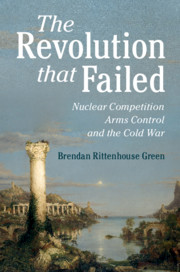Book contents
- The Revolution that Failed
- The Revolution that Failed
- Copyright page
- Dedication
- Epigraph
- Contents
- Figures and Tables
- Acknowledgments
- Introduction
- 1 The Nuclear Revolution Revisited
- 2 The Delicacy of the Nuclear Balance
- 3 Comparative Constitutional Fitness
- 4 Testing the Argument against Its Competitors
- 5 Nixon and the Origins of Renewed Nuclear Competition, 1969–1971
- 6 Nixon, Ford, and Accelerating Nuclear Competition, 1971–1976
- 7 The Rise of Nuclear Warfighting, 1972–1976
- 8 Carter and the Climax of the Arms Race, 1977–1979
- 9 The Revolution that Failed
- Index
5 - Nixon and the Origins of Renewed Nuclear Competition, 1969–1971
Published online by Cambridge University Press: 26 February 2020
- The Revolution that Failed
- The Revolution that Failed
- Copyright page
- Dedication
- Epigraph
- Contents
- Figures and Tables
- Acknowledgments
- Introduction
- 1 The Nuclear Revolution Revisited
- 2 The Delicacy of the Nuclear Balance
- 3 Comparative Constitutional Fitness
- 4 Testing the Argument against Its Competitors
- 5 Nixon and the Origins of Renewed Nuclear Competition, 1969–1971
- 6 Nixon, Ford, and Accelerating Nuclear Competition, 1971–1976
- 7 The Rise of Nuclear Warfighting, 1972–1976
- 8 Carter and the Climax of the Arms Race, 1977–1979
- 9 The Revolution that Failed
- Index
Summary
Richard Nixon came to power amid international conflict in Vietnam and domestic tumult over the war’s repercussions at home. These forces both created pressure for major changes in American foreign policy – it is not for nothing that Nixon’s inaugural address promised a turn away from “an era of confrontation” toward an “era of negotiation.” But this new strategy, which soon became known as détente, was stillborn for the first two and a half years of the administration: neither the president nor his consigliere, National Security Advisor Henry Kissinger, could make much progress negotiating with the Soviets over issues spanning from Vietnam to the Middle East to Europe. It was not until the initial superpower agreement on the nature of nuclear arms control, in May 1971, that the policy of détente scored its first success and began to develop real momentum.
- Type
- Chapter
- Information
- The Revolution that FailedNuclear Competition, Arms Control, and the Cold War, pp. 87 - 120Publisher: Cambridge University PressPrint publication year: 2020



